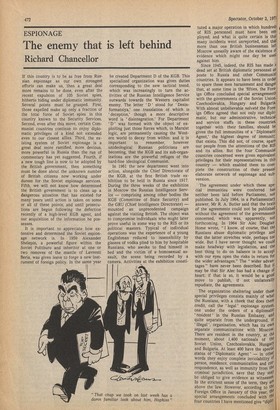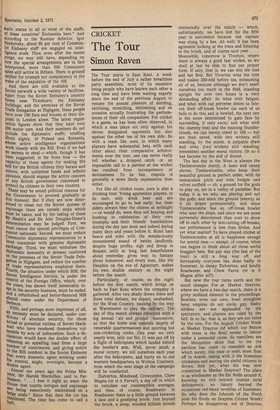The enemy that is left behind
Richard Chancellor
If this country is to be as free from Russian espionage as our own strongest efforts can make us, then a great deal more remains to be done, even after the recent expulsion of 105 Soviet spies, hitherto hiding under diplomatic immunity. Several points must be grasped. First, those expelled make up only a fraction of the total force of Soviet spies in this country known to the Security Services. Second, even after this move, certain Communist countries continue to enjoy diplomatic privileges of a kind not extended even to our closest allies. Third, the existing system of Soviet espionage is a great deal more ramified, more devious, more powerful in Russia than the run of commentary has yet suggested, Fourth, if a new tough line is now to be adopted by the British government, then something must be done about the unknown number of British citizens now working under duress for the Soviet espionage services. Fifth, we will not know how determined the British government is to clean up a dangerous situation that has existed for many years until action is taken on some or all of these points; and until prosecutions are begun following the defection ' recently of a high-level KGB agent, and our acquisition of the information he possesses.
It is important to appreciate how extensive and determined the Soviet espionage network is. In 1959 Alexander Shelepin, a powerful figure within the Soviet Politburo and inheritor at one or two removes of the mantle of Lavrenti Beria, was given leave to forge a new instrument of foreign policy. In the same year he created Department D of the KGB. This specialized organization was given duties corresponding to the new tactical trend, which was increasingly to turn the activities of the Russian Intelligence Service outwards towards the Western capitalist enemy. The letter ' D' stood for Desinformatsiya,' one translation of which is deception,' though a more descriptive word is disintegration.' For Department ' D ' was formed with the object of exploiting just those forces which, in Marxist logic, are permanently causing the Western world to decay from within: and it is important to remember, however unideological Russian politicians are becoming, that the KGB and its sub-organizations are the powerful refuges of the hard-line ideological Communist.
In 1961 the new department went into action, alongside the Chief Directorate of the KGB, at the first British trade exhibition to be held in Russia since 1917. During the three weeks of the exhibition in Moscow the Russian Intelligence Service — comprising among other bodies the KGB (Committee of State Security) and the GRU (Chief Intelligence Directorate) — mounted an unprecedented campaign against the visiting British. The object was to compromise individuals who might later prove useful in some way to the RIS or its political masters. Typical of individual operations was the experience of a young Englishman reduced to insensibility by glasses of vodka plied to him by hospitable Russians, who awoke to find himself in bed and the victim of ahomosexual assault, the scene being recorded by a camera. Activities at the exhibition consti
tuted a major operation in which hundreds( of RIS personnel must have been errs' , ployed; and what is quite certain is that many incidents went unreported, and that more than one British businessman left Moscow uneasily aware of the existence of evidence which might one day be used against him.
Since 1945, indeed, the RIS has made dead set at British diplomatic personnel 01 poste to Russia and other Communist countries. It appears to have been in ordet to spare these men harassment and danger that, at some time in the 'fifties, the Fore. ign Office concluded special arrangementS with the governments of the Soviet Union, Czechoslovakia, Hungary and Bulgaria. With almost unbelievable naiveté the Fore. ign Office agreed that not only our diplo. matic, but our administrative, technical and service staffs in these countries, together with their families, should be given the full immunities of a 'Diplomatic Agent,' the highest degree of immunit}' that exists. This did not, of course, spare our people from the attentions of the RIS and its allies. But the four Communist countries concerned were given equivalent privileges for their representatives in this country — which enabled them to corn' plete the construction of their present elaborate network of espionage and sub' version.
The agreement under which these spe* cial immunities were conferred hag neither been laid before Parliament, nor published. In July 1964, in a ParliamentarY answer, Mr R. A. Butler said that the texts of' the agreements could not be published without the agreement of the governments concerned, which was, apparently, not forthcoming. In 1964 Sir Alec Douglas' Home wrote, "I know, of course, that the Russians abuse diplomatic privilege and that the latter stretches wide, perhaps too wide. But I have never thought we could make headway with legislation, and the best thing to do on balance is to accept with our eyes open the risks in return for the wider advantages." The "wider advarr tages " have never been described. But it may be that Sir Alec has had a change of heart: if that is so, it would be a good move to publish, if not unilaterallY repudiate, the agreements.
The organization sheltering under these special privileges consists mainly of what the Russians, with a cheek that does there credit, call the ' legal ' espionage systeih, one under the orders of a diplomatic ' resident ' in the Russian Embassy, and quite separate from the underground, Or illegal ', organisation, which has its ovie separate communications with Mosco0 There are resident in the country, at the moment, about 1,400 nationals of the Soviet Union, Czechoslovakia, Hungati, and Bulgaria. At least 400 have the specie' status of Diplomatic Agent' — in other, words they enjoy complete inviolability 0' person, residence, communication and cot' respondence, as well as immunity from the criminal jurisdiction, save that they maY be obliged to give evidence as witnesses' In the strictest sense of the term, they ere above the law. However, according to the Foreign Office in January of this year, the special arrangements concluded with the four countries I have mentioned give "diplo" Matte status to all or most of the staffs Of these countries' Embassies here." And according to the Russian defector, Igor Penkovsky, about 60 per cent of Commun1st Embassy staff are engaged on intelligence work. Thus, even after the recent Purge, we may still have, depending on how the special arrangements are in fact interpreted, more than 500 Communist Spies still active in Britain. There is ground neither for triumph nor complacency in the wake of the expulsion of the 105. And there are still available to the Soviet network a wide variety of facilities. Apart from the Soviet Embassy's country house near Ticenhurst, the Embassy buildings, and the premises of the Soviet Trade Delegation at Highgate, these people have over 100 flats and houses at their disposal in London alone. The latest registration figures show that they have over 300 motor cars. And their numbers do not include the diplomatic staffs, totalling about eighty, of Poland and Romania, Whose active intelligence organizations Work closely with the RIS. Even if we had no secrets to steal — which, though it has been suggested, is far from true — the capacity of these agents for making life hell for the British citizens they harass and suborn, with unlimited funds and infinite Patience, should engage the active concern Of any British government concerned to Protect its citizens in their own country. There may be sound political reasons for the Government to proceed gradually at this moment. But if .they are now determined to clean out the Soviet system of espionage there are certain steps which Inust be taken, and by the taking of these Mr Heath's and Sir Alec Douglas-Home's determination may be judged. First, we Must cancel the special privileges of ComMunist nationals. Second, we must reduce Communist diplomatic representation to a level consistent with genuine diplomatic exchange. Third, we must withdraw the diPlomatic immunity at present conferred on the premises of the Soviet Trade Delegation in Highgate, and reduce the number °f trade representatives employed there. Fourth, the situation under which MI6, the Secret Intelligence Service, is under the control of the Foreign Office, which, over the years, has shown itself lamentably inat in the security business, must be ended, and a refurbished and better-financed MI6 should come under the Department of Defence. Fifth, and perhaps most important of all, .amnesty must be declared, under conaitions of absolute security, for those actnal or potential victims of Soviet blackMail who have rendered themselves vulnerable by acts of indiscretion. Such a declaration would have the double effect of releasing an appalling load from a large number of consciences, and giving notice t.9 the RIS resident in the Soviet Embassy !hat every domestic agent working under ins control, might, overnight, become a double agent. Almost ten years ago the Prime Minlister, , Mr Harold Macmillan, said in Par ,larnent, " I feel it right to warn the House that hostile intrigue and espionage .are being relentlessly maintained on a large scale." Since that date the rot has continued. The time has come to call a halt.

































 Previous page
Previous page